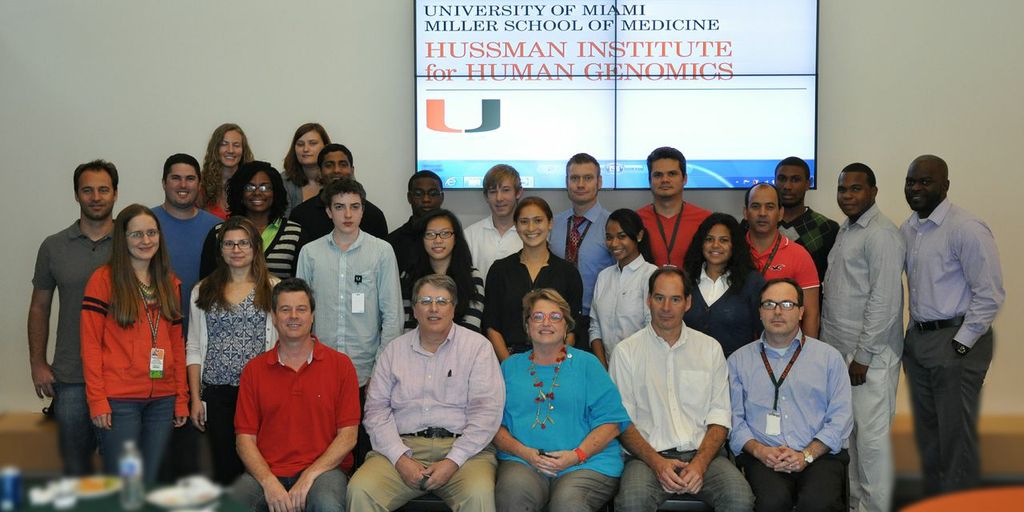
Internship immerses students in medical research
Aaron Uhlenberg is research support and education coordinator at the John P. Hussman Institute for Human Genomics at the University of Miami Miller School of Medicine. Below, he writes about the JJ Vance Memorial Summer Internship program, which is supported by Knight Foundation.
Growing up in Chapel Hill, N.C., I was friends with a boy named Jeffery Joseph “JJ” Vance, but in 1998 JJ died from a rare blood clotting disorder called thrombotic storm. He was only 14.
Today, there’s an internship program here at the University of Miami that remembers him. The most recent participants, eight students from South Florida high schools, just completed two challenging months of working alongside our faculty, postdoctoral associates, graduate students and staff.
The JJ Vance Memorial Summer Internship in the Biological and Computational Sciences began several years ago at the Duke University Center for Human Genetics. It’s where I first became involved with the program. JJ’s parents, Margaret A. Pericak-Vance, PhD, and Dr. Jeffery M. Vance, PhD, started it in their son’s honor to offer rising high school seniors an opportunity to be involved in scientific research.
The Vances brought the internship with them when they relocated to the John P. Hussman Institute for Human Genomics. We’ve held the program here for five years, and it’s continuing to grow. When the program first began at Duke, there were about two interns a year selected from two local high schools. This year, we had 58 students representing 24 different Miami-area high schools apply. The eight interns who were accepted had an unprecedented 5.24 median grade point average.
On Aug. 7 the students presented their work to family, friends and mentors at a celebratory luncheon. When they started the program, they had only basic knowledge of genetics and computational sciences. At the end of the internship, they were able to teach many of us who have worked in the field for years a thing or two.
The interns described how they assisted researchers with ongoing projects such as the genetics of Alzheimer’s disease, autism, Parkinson’s disease, hearing loss, and Charcot-Marie-Tooth disease, a hereditary neurological disorder. They also shared how they learned new laboratory and statistical techniques, such as genetic analysis and working with stem cells.
Thanks in part to the support of Knight Foundation, the program pays interns a stipend, which gave students from many socioeconomic backgrounds the opportunity to participate. “Being a minority in my community and coming from a low-income family, I never thought that these types of opportunities existed,” said Julie Luo, an intern from Miami Lakes Educational Center. “This internship has opened up a lot of options with what I can do with my future.”
It was rewarding not only to see how much the interns learned, but also to hear how much the internship meant to them. “It has been an amazing eight weeks!” said Kassala Collington, an intern from North Miami Beach Senior High School. “I improved my lab skills, experienced a new way of thinking, and met really awesome people.”
Many of the interns from past years still turn to their mentors for advice. A couple have returned here to work on their senior projects, while others have worked with us over their college summer breaks. Some of them have gone on to study at Yale, Harvard, Princeton, Vanderbilt, and, of course, the University of Miami. We’ve even had some serve as college mentors to other interns. It’s a meaningful way to see JJ’s memory live on.
To learn more about the internship, visit jjvance.org
2013 JJ Vance interns and presentations
Intern
High School
Presentation Title
Kevin Clark
Coral Reef Senior High School
Bioinformatics
Kassala Collington
North Miami Beach Senior High School
Genetics of autism and site-directed mutagenesis in the GABRA4 3’UTR
Isabelle Csete
New World School of the Arts
Charcot-Marie-Tooth disease genetic research
Tiffanie Henriquez
North Miami Senior High School
Mouse model of 2q23.1 micro-deletion syndrome
Michael Ivory
North Miami Senior High School
The role of mitochondrial dysfunction in the pathogenesis of Parkinson disease
Julie Luo
Miami Lakes Educational Center
Hereditary hearing loss
Sachin Parekh
Gulliver Preparatory School
Induced pluripotent stem cells (iPSC)
Briana Ramirez
Miami Jackson Senior High School
PCR optimization and Alzheimer’s disease genetic research
Recent Content
-
Community Impactarticle ·
-
Community Impactarticle ·
-
Community Impactarticle ·


